It's been half term holiday week here; where has it all gone I'm asking, as I go back to work tomorrow.
I s to have spent much of the week working hard to tackle all the complex issues I have to deal with ready for next year.
A brief reflection on our trip to Bolton on Friday 18th February is quite calming and re-assuring that my job is a good one. Unfortunately Faye was not in the "prize money" on this occasion, but we both had a great day out, and were very well treated by our hosts.
Some photographs are attached as Faye presented her Nettle Bread to a judging panel of VIPs, including Brett Warburton, the man in the open neck shirt, busily checking out her loaf, and asking very pertinent questions. How cool is that? Also on the panel was the head of Innovation for Warburtons, Darren Littler, who I met some years ago when still a student myself. Many of Warburtons R&D team were taught by the same lecturer as me, on the Baking course at Leeds.
Faye's bread was one of only 2 loaves which were genuinely artisan and made with a pre-ferment. The other 2 Baking colleges in the hunt both used bread improvers in their loaves. The other 4 entrants' loaves were from catering students, and looked like fairly ordinary homebaked bread. What matters, however, were all the students' wonderful ideas and the hardwork put in to develop their loaves. And, it cannot be an easy task to stand in front of 3 esteemed bakers from the Warburtons Company, and present your own product, and talk about it so confidently. I was really proud of Faye, especially when she stated simply that she used a leaven in her bread as she was only interested in "artisan" bread, then proceeded to explain to Darren how she had built her own leaven from scratch, and kept it going all this time. Some photographs below:
Level 2 Baking Students have an entrance into the College "Equality and Diversity" Competition tomorrow, with a theme based on breads of the world. These are to be made with our own local ingredients, primarily, and presented in a Cornucopia, made from bread dough. My contribution is the Borodinsky bread shown below. Given I had an active rye sourdough, a bag of good bread flour, and plenty of Bacheldre Dark Rye, I could not resist more baking today, with a Pain de Siegle.
Borodinsky using a "Scald"
Makes 1 "Pullman Pan"
|
Material |
Formula [% of flour] |
Recipe [grams] |
|
1. Rye Sourdough |
|
|
|
Dark Rye Flour |
30 |
300 |
|
Water |
50 |
500 |
|
TOTAL |
80 |
800 |
|
|
|
|
|
2. "Scald" |
|
|
|
Dark Rye Flour |
20 |
200 |
|
Barley Malt Syrup |
4.5 |
45 |
|
Blackstrap Molasses |
6 |
60 |
|
Coriander Seeds-ground |
1 |
10 |
|
Salt |
1 |
10 |
|
Water |
35 |
350 |
|
TOTAL |
67.5 |
675 |
|
|
|
|
|
3. Final Paste |
|
|
|
Rye Sourdough [from above] |
80 |
800 |
|
Scald [from above] |
67.5 |
675 |
|
Sifted Rye Flour |
23.5 |
235 |
|
Strong White Flour |
26.5 |
265 |
|
TOTAL |
197.5 |
1975 |
|
Overall Hydration |
85% |
|
|
Pre-fermented Flour |
30% |
|
Method:
- Build the rye sourdough over 2 to 3 refreshments from stock. Ferment fully after final refreshment through to sour
- For the "Scald", dissolve the molasses and malt extract in hot water, and bring to a boil in a pan. Grind the Coriander seeds and combine these with the salt and rye flour. Pour on the boiling liquor and stir to mix. Cover tightly and cool to ambient.
- Combine the sour and scald for the first stage of the final mix, then add in the remaining portions of flour to form a paste
- Bulk proof for one hour
- Shape into a Pullman Pan, pre-lined with silicone paper. Proof for 3 hours, approx. before baking
- Place into the oven rising to 180°C, with a pan of water in the bottom of the oven. Leave for one hour. Turn the oven down to 130°C and bake a further 3 hours. Turn the oven off and leave in the cooling oven a further 3 hours
- De-pan and cool on wires

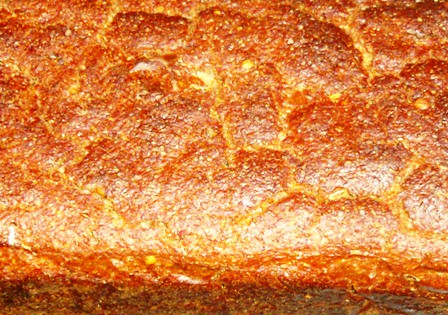
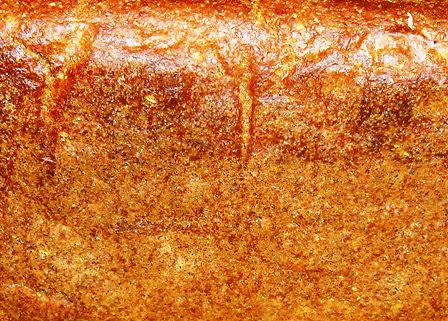
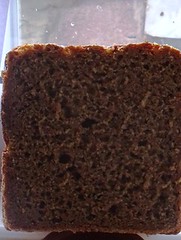

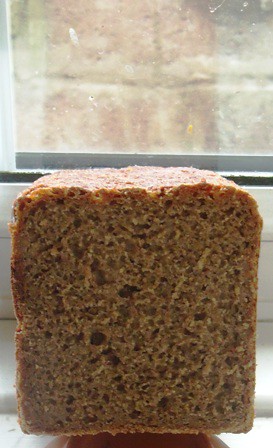
Pain de Siègle
2 Boules of classic naturally leavened bread proved in Bannetons.
|
Material |
Formula [% of flour] |
Recipe [grams] |
|
1. Rye Sourdough |
|
|
|
Bacheldre Dark Rye Flour |
24 |
300 |
|
Water |
40 |
500 |
|
TOTAL |
64 |
800 |
|
|
|
|
|
2. Final Dough |
|
|
|
Rye Sourdough [from above] |
64 |
800 |
|
Carrs Strong White Flour |
76 |
950 |
|
Salt |
1.8 |
22.5 |
|
Water |
28 |
350 |
|
TOTAL |
169.8 |
2122.5 |
|
Overall Hydration |
68% |
|
|
Pre-fermented Flour |
24% |
|
Method:
- Build the rye sourdough from stock with at least 2 refreshments
- Weigh the required sourdough, and add the correct amount of water to this. Blend, then carefully add the white flour. Combine, and autolyse for 1 hour.
- Start to develop the dough on the bench with 5 minutes work. Rest for 10 minutes. Add the salt, and develop the dough a further 5 - 10 minutes. Rest for 10 minutes, then develop a further 5 - 10 minutes.
- Line a bowl with a little oil as a container for the dough. Cover with cling film and bulk proof for 2 hours. Stretch and fold after 1 hour.
- Scale and divide. Mould round and place upside down in prepared bannetons.
- Final proof is approximately 3 hours.
- Pre-heat the oven and masonry to 250°C. Tip out each loaf, score the top, use steam, and bake for 15 minutes. Drop the oven temperature to 220°C and bake a further 20 minutes. Drop the oven temperature to 200°C and bake each loaf out.
- Cool on wires
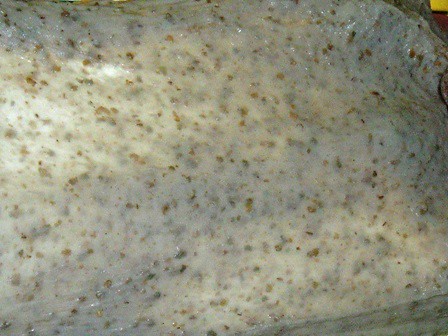
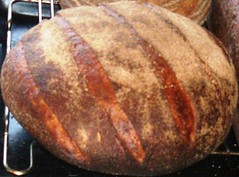
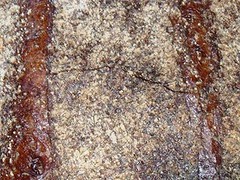
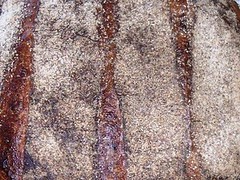
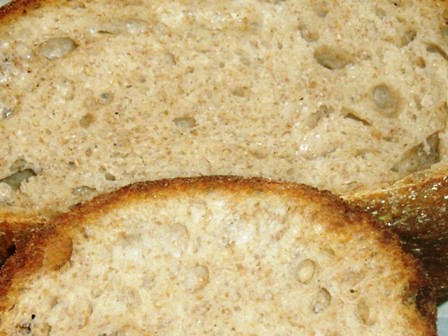
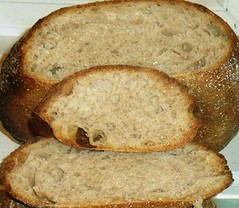
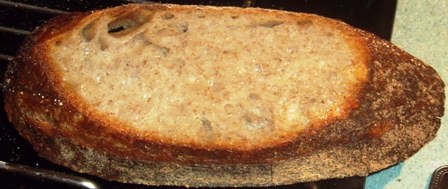
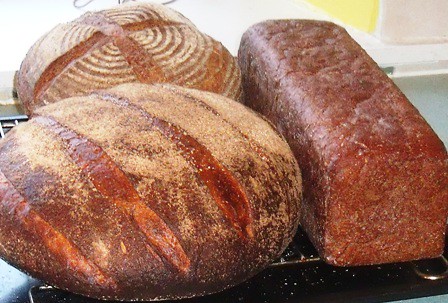
It's proving hard to spend so much time on TFL at the moment. I wish I had more time to post, but it's a tough time in UK education right now, with lots of challenges needing full response.
Andy
- ananda's Blog
- Log in or register to post comments
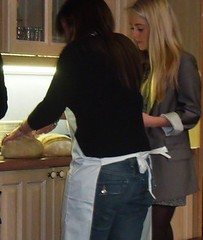

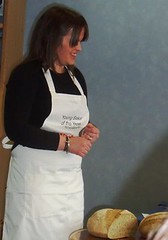

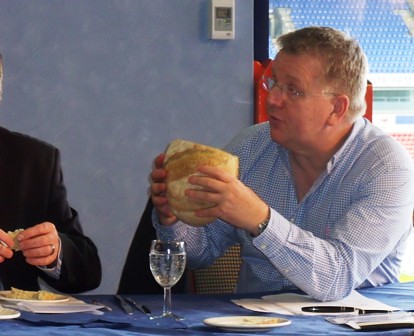
Congratulations to you, Andy, and to Faye! Great effort - I've nothing but admiration for her high standards. She's had a great teacher.
As for your breads, they're stellar as always.
You'll catch up when things slow down, so enjoy the fun of your work.
For your kind comments, and re-assuring words.
Faye has been a really good student for 3 years in College; her work ethic is strong. Her leadership in a group is of much value.
Sadly, things never slow down at Newcastle College; it's a case of keep ahead, or fall off! Yes, it's that challenging, especially right here, right now
It's really good to hear from you
BW
Andy
Beautiful Ryes, Andy!
They complement and contrast each other nicely. Pain de Siegle is a great everyday bread, like your lovely wholewheat offerings. Half of that Borodinsky bread had been eaten as samples by staff and students before we even got to coffee break this morning. The flavour is full-on, with no accompaniment needed. The taste lingers long and pleasant on the palate.
Best wishes
Andy
That's a tough one to get right and you hit it.
It must be pleasing to you to see Faye representing herself and the school so well. She will go far, no doubt. Maintaining the cultural integrity of bread is important in the Artisan movement.
Cheers,
Eric
Hi Eric,
Yes, this bread can be difficult to get absolutely right. And I had to ring a few changes on this occasion.
I used the soaker for the first time. That was a big success, actually.
I also used a portion of white flour in the final paste. I only did this because I'm struggling to source Light Rye at the moment. Ideally, I would have added all Light Rye in the final formula [50% of the total flour in the formula]. It's not very pleasant stuff to handle, and I dislike its claggy texture in cakes; however, it makes a surprisingly light bread given a voraciously active rye sourdough as mine always seems to be.
The group work today on cultural integrity was quite uplifting for our School Equality and Diversity competition. An Italian making regional Sicilian breads, an Irishwoman making soda farls, Sri Lankan baking a local sweet bread, plus a Spelt "Roman Britain" style bread, Baguettes Traditional, Bara Brith plus the Borodinsky. All of these to be housed in a woven basket and a Cornucopia, courtesy of Mr. Hamelman's instructions. What fun!
All good wishes
Andy
I see you've been a busy man. Congratulations to both you and Faye. That one picture of her really captures the enthusiasm she brought to the event.
The rye looks splendid! I'm in a new job and we just got in a dozen pullman pans today, so I spent time seasoning them and preparing for their maiden voyage (I think it will be a pain de lait), but rye will beckon I'm sure.
Good baking and instructing!
Larry
I've been tuning in to TFL, but really too busy to post much I'm afraid.
It's really good to hear from you. Is this new job an exciting opportunity for you?
Yes, it was so good to watch Faye as she delivered a confident presentation to such key players in the modern UK baking industry. A great opportunity, siezed on, after such a delay, too.
Milk breads are not my favourite; I'm sure you'll do a good job of convincing that the bread pans should be used for rye products...best of luck
All good wishes
Andy
that all went so well, even though Faye didn't make the "prize money", it must have been a great experience.
What kind of bread was the winner, then, one with all kinds of enhancers? What were the criteria?
Your breads look, of course, wonderful - as to be expected.
Karin
Hi Karin,
The winning bread I believe was made as a bulk fermented tinned loaf. It was unusual and attractive, made up of a three stranded braid.
One strand was nettle flavoured [!], another tomato, and another was spinach. The outer appearance was definitely superior to the internal crumb which looked a little odd...although very colourful, obviously.
My main problem was thinking the ingredients would meld together as quite an odd combination.
The criteria was for a young person to design and bake their own bread, and supply the bread and recipe to present to the judging panel.
2 entrants used no time with improvers, 2 used pre-ferments, and the other 4 were bulk fermented recipes, I believe.
I'm obviously very biassed in my choices for favourites!!!
Many thanks for your original ideas for inspiration, and for your kind comments about my own bread postings
Best wishes
Andy
Hi Carl,
Thanks for asking such an interesting question.
The participants were required to give their own presentations to the Judges. Faye specifically said she used a leaven in her bread, and gave her reason as being her interest in Artisan breads. It was Darren, from the panel, who then went on to ask her for more detail about how she created the leaven in the first place, etc etc.
So too with those candidates from the Baking Colleges. If the process information did not come out in their presentation, then the judges asked questions to clearly elicit such information...and, in detail, too.
Best wishes
Andy